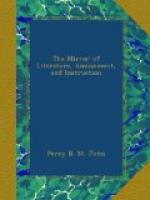The character of the gipsy has not been well understood. It is altogether oriental: he is quiet, patient, sober, long suffering, pleasant in speech, indolent but handy, far from speculative, and yet good at succedaneum: when his anger is kindled, it descends like lightning: unlike his dog, his wrath gives no notice by grumbling: he blazes up like one of his own fires of dried fern. Quarrels do not often take place among them, but when they do, they are dreadful. The laws of the country in which they sojourn have so far banished the use of knives from among them that they only grind them, otherwise these conflicts would always be fatal. They fight like tigers with tooth and nail, and knee and toe, and seem animated only with the spirit of daemonism. Luckily the worst weapon they use is a stick, and, if the devil tempts, a hedge-stake.
We have been put in mind to say something of the gipsies by having witnessed the consequences of one of these affrays, which has brought us still better acquainted with these singular people. A quarrel originating in jealousy had produced results of the most serious nature. A blow on the head with a tent-pole had evidently produced concussion of the brain if not fracture, and the victim was lying on his straw bed in a state of profound coma. The tent was tripartite, being formed of three main tops meeting in a centre: one was sacred to the women—the gynekeion of the Greeks, the anderoon of the Persians: in the others were collected the whole faction of the dying man. Nine or ten swarthy but handsome countenances were anxiously watching the struggling breath of their unhappy comrade—some sobbing, some grief-stricken, some sombre, none savage. An old crone was administering ineffectual milk, perhaps the very woman who had found the same fluid so nutritious some thirty years ago. Before, or rather, under her lay as noble a form as nature ever moulded, with a fine dark, but thoroughly Indian face, covered with the clammy sweat of apoplectic death. There was no want of light, the fire at the mouth every now and then sent in a volume of illumination, and when the medical men arrived there was scarcely a hand that did not contain a candle in the hope of aiding their investigation. The man died on the fourth day: the surgeons were compelled to mangle him in their search for a fracture; after his death justice demanded a still further investigation of the corpse: and yet during all these trying circumstances an important witness can declare that the behaviour of the supposed lawless people was not merely decent—it was more than exemplary—it was delicate, tender, nay, refined; it was moreover exempt from prejudice, at the same time that it was full of feeling. Were the details in place here, it would perhaps be allowed that few brighter examples of friendship and right feeling were to be found than in this instance occurred among the “dark race,” as they call themselves.
New Monthly Magazine.




